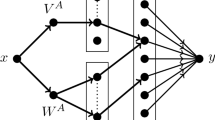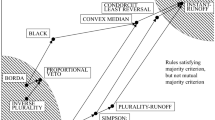Abstract
We study the behavior of Range Voting and Normalized Range Voting with respect to electoral control. Electoral control encompasses attempts from an election chair to alter the participation or structure of an election in order to change the outcome. We show that a voting system resists a case of control by proving that performing that case of control is computationally hard. Range Voting is a natural extension of approval voting, and Normalized Range Voting is a simple variant which alters each vote to maximize the potential impact of each voter. We show that Normalized Range Voting has among the largest known number of control resistances among natural voting systems.
Similar content being viewed by others
Notes
Note that since k-NRV is resistant to deletion of candidates for k=2, this reduction shows resistance for 4-NRV.
References
Arrow, K.: A difficulty in the concept of social welfare. J. Polit. Econ. 58(4), 328–346 (1950)
Baumeister, D., Erdélyi, G., Hemaspaandra, E., Hemaspaandra, L., Rothe, J.: Computational aspects of approval voting. In: Laslier, J., Sanver, R. (eds.) Handbook of Approval Voting, pp. 199–251. Springer, Berlin (2010)
Brelsford, E., Faliszewski, P., Hemaspaandra, E., Schnoor, H., Schnoor, I.: Approximability of manipulating elections. In: Proceedings of the 23rd AAAI Conference on Artificial Intelligence, July 2008, pp. 44–49 (2008)
Betzler, N., Niedermeier, R., Woeginger, G.: Unweighted coalitional manipulation under the Borda rule is NP-hard. In: Proceedings of the 22nd International Joint Conference on Artificial Intelligence, pp. 55–60 (2011)
Bartholdi, J. III, Tovey, C., Trick, M.: The computational difficulty of manipulating an election. Soc. Choice Welf. 6(3), 227–241 (1989)
Bartholdi, J. III, Tovey, C., Trick, M.: How hard is it to control an election? Math. Comput. Model. 16(8/9), 27–40 (1992)
Betzler, N., Uhlmann, J.: Parameterized complexity of candidate control in elections and related digraph problems. In: Proceedings of the 2nd Annual International Conference on Combinatorial Optimization and Applications. Lecture Notes in Computer Science, vol. 5156, pp. 43–53. Springer, Berlin (2008)
Conitzer, V., Sandholm, T.: Complexity of manipulating elections with few candidates. In: Proceedings of the 18th National Conference on Artificial Intelligence, July/August 2002, pp. 314–319 (2002)
Conitzer, V., Sandholm, T.: Nonexistence of voting rules that are usually hard to manipulate. In: Proceedings of the 21st National Conference on Artificial Intelligence, pp. 627–634. AAAI Press, Menlo Park (2006)
Davies, J., Katsirelos, G., Narodytska, N., Walsh, T.: Complexity of and algorithms for Borda manipulation. In: Proceedings of the 25th AAAI Conference on Artificial Intelligence, August (2011)
Duggan, J., Schwartz, T.: Strategic manipulability without resoluteness or shared beliefs: Gibbard–Satterthwaite generalized. Soc. Choice Welf. 17(1), 85–93 (2000)
Erdélyi, G., Fellows, M.: Parameterized control complexity in bucklin voting and in fallback voting. In: Proceedings of the 3rd International Workshop on Computational Social Choice, pp. 163–174 (2010)
Erdélyi, G., Hemaspaandra, L., Rothe, J., Spakowski, H.: Generalized juntas and NP-hard sets. Theor. Comput. Sci. 410(38–40), 3995–4000 (2009)
Erdélyi, G., Nowak, M., Rothe, J.: Sincere-strategy preference-based approval voting fully resists constructive control and broadly resists destructive control. Math. Log. Q. 55(4), 425–443 (2009)
Erdélyi, G., Piras, L., Rothe, J.: The complexity of voter partition in Bucklin and fallback voting: solving three open problems. In: Proceedings of the 10th International Conference on Autonomous Agents and Multiagent Systems, pp. 837–844 (2011)
Erdélyi, G., Rothe, J.: Control complexity in fallback voting. In: Proceedings of Computing: The 16th Australasian Theory Symposium, pp. 39–48 (2010)
Faliszewski, P., Hemaspaandra, E., Hemaspaandra, L.: The complexity of bribery in elections. J. Artif. Intell. Res. 35, 485–532 (2009)
Faliszewski, P., Hemaspaandra, E., Hemaspaandra, L., Rothe, J.: Llull and Copeland voting computationally resist bribery and constructive control. J. Artif. Intell. Res. 35, 275–341 (2009)
Faliszewski, P., Hemaspaandra, E., Hemaspaandra, L., Rothe, J.: The shield that never was: Societies with single-peaked preferences are more open to manipulation and control. Inf. Comput. 209(2), 89–107 (2011)
Friedgut, E., Kalai, G., Nisan, N.: Elections can be manipulated often. In: Proceedings of the 49th IEEE Symposium on Foundations of Computer Science, October 2008, pp. 243–249 (2008)
Gibbard, A.: Manipulation of voting schemes. Econometrica 41(4), 587–601 (1973)
Garey, M., Johnson, D.: Computers and Intractability: A Guide to the Theory of NP-Completeness. Freeman, New York (1979)
Hemaspaandra, E., Hemaspaandra, L., Rothe, J.: Anyone but him: The complexity of precluding an alternative. Artif. Intell. 171(5–6), 255–285 (2007)
Hemaspaandra, E., Hemaspaandra, L., Rothe, J.: Hybrid elections broaden complexity-theoretic resistance to control. Math. Log. Q. 55(4), 397–424 (2009)
Hillinger, C.: The case for utilitarian voting. Discussion Papers in Economics 653, University of Munich, Department of Economics, May (2005)
Isaksson, M., Kindler, G., Mossel, E.: The geometry of manipulation—a quantitative proof of the Gibbard-Satterthwaite theorem. Combinatorica 32(2), 221–250 (2012)
Liu, H., Feng, H., Zhu, D., Luan, J.: Parameterized computational complexity of control problems in voting systems. Theor. Comput. Sci. 410(27–29), 2746–2753 (2009)
Liu, H., Zhu, D.: Parameterized complexity of control problems in maximin election. Inf. Process. Lett. 110(10), 383–388 (2010)
Mossel, E., Procaccia, A., Rácz, M.: A smooth transition from powerlessness to absolute power. Technical Report (2012). arXiv:1205.2074 [cs.GT]
Mossel, E., Rácz, M.: A quantitative Gibbard-Satterthwaite theorem without neutrality. In: Proceedings of the 44th ACM Symposium on Theory of Computing, May 2012, pp. 1041–1060 (2012)
Procaccia, A., Rosenschein, J.: Average-case tractability of manipulation in voting via the fraction of manipulators. In: Proceedings of the 6th International Joint Conference on Autonomous Agents and Multiagent Systems, pp. 718–720 (2007)
Procaccia, A., Rosenschein, J.: Junta distributions and the average-case complexity of manipulating elections. J. Artif. Intell. Res. 28, 157–181 (2007)
Parkes, D., Xia, L.: A complexity-of-strategic-behavior comparison between Schulze’s rule and ranked pairs. In: Proceedings of the 26th AAAI Conference on Artificial Intelligence, pp. 1429–1435 (2012)
Satterthwaite, M.: Strategy-proofness and Arrow’s conditions: existence and correspondence theorems for voting procedures and social welfare functions. J. Econ. Theory 10(2), 187–217 (1975)
Smith, W.: Range voting. http://web.archive.org/web/20090326062716/. http://math.temple.edu/~wds/homepage/rangevote.pdf, November 2000
Walsh, T.: Where are the hard manipulation problems? J. Artif. Intell. Res. 42, 1–29 (2011)
Xia, L., Conitzer, V.: Generalized scoring rules and the frequency of coalitional manipulability. In: Proceedings of the 9th ACM Conference on Electronic Commerce, July 2008, pp. 109–118 (2008)
Xia, L.: How many vote operations are needed to manipulate a voting system? In: Proceedings of the 4th International Workshop on Computational Social Choice, September (2012)
Zuckerman, M., Procaccia, A., Rosenschein, J.: Algorithms for the coalitional manipulation problem. Artif. Intell. 173(2), 392–412 (2009)
Acknowledgements
For helpful comments and suggestions, I am grateful to Edith Hemaspaandra, who advised my M.S. thesis in which an earlier version of part of this work appeared, Lane A. Hemaspaandra, Preetjot Singh, Andrew Lin, and the anonymous ToCS referees.
Author information
Authors and Affiliations
Corresponding author
Additional information
Supported in part by NSF grants CCF-0426761, IIS-0713061, CCF-0915792, and CCF-1101479.
Rights and permissions
About this article
Cite this article
Menton, C. Normalized Range Voting Broadly Resists Control. Theory Comput Syst 53, 507–531 (2013). https://doi.org/10.1007/s00224-012-9441-0
Published:
Issue Date:
DOI: https://doi.org/10.1007/s00224-012-9441-0




